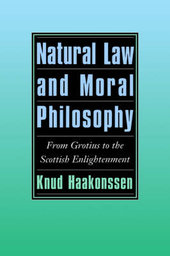
|
Natural Law and Moral Philosophy: From Grotius to the Scottish Enlightenment
Hardback
Main Details
| Title |
Natural Law and Moral Philosophy: From Grotius to the Scottish Enlightenment
|
| Authors and Contributors |
By (author) Knud Haakonssen
|
| Physical Properties |
| Format:Hardback | | Pages:400 | | Dimensions(mm): Height 236,Width 159 |
|
| Category/Genre | Western philosophy - c 1600 to c 1900
Ethics and moral philosophy |
|---|
| ISBN/Barcode |
9780521496865
|
| Classifications | Dewey:171.2 |
|---|
| Audience | | Professional & Vocational | |
|---|
|
Publishing Details |
| Publisher |
Cambridge University Press
|
| Imprint |
Cambridge University Press
|
| Publication Date |
23 February 1996 |
| Publication Country |
United Kingdom
|
Description
This major contribution to the history of philosophy provides the most comprehensive guide to modern natural law theory available, sets out the full background to liberal ideas of rights and contractarianism, and offers an extensive study of the Scottish Enlightenment. The time span covered is considerable: from the natural law theories of Grotius and Suarez in the early seventeenth century to the American Revolution and the beginnings of utilitarianism. After a detailed survey of modern natural law theory, the book focuses on the Scottish Enlightenment and its European and American connections. Knud Haakonssen explains the relationship between natural law and civic humanist republicanism, and he shows the relevance of these ideas for the understanding of David Hume and Adam Smith. The result is a completely revised background to modern ideas of liberalism and communitarianism.
Reviews'... an interesting and important set of historical studies, written clearly and straightforwardly, resting on massive scholarship, and arguing for some challenging theses about matters that are still of lively theoretical interest.' J. B. Schneewind, The Johns Hopkins University ' ... What makes the volume much more than a collection of articles, however, is the trouble the author has taken to ensure that the argument moves forward from chapter to chapter. This, in turn, is supported by an informed sense of the argument's relation to other interpretations of Scottish philosophy, as well as by an unusual grasp of the considerable amount of relevant scholarship published in German.' British Journal of Eighteenth-Century Studies
|